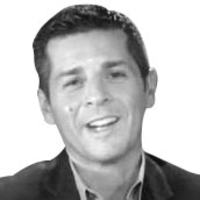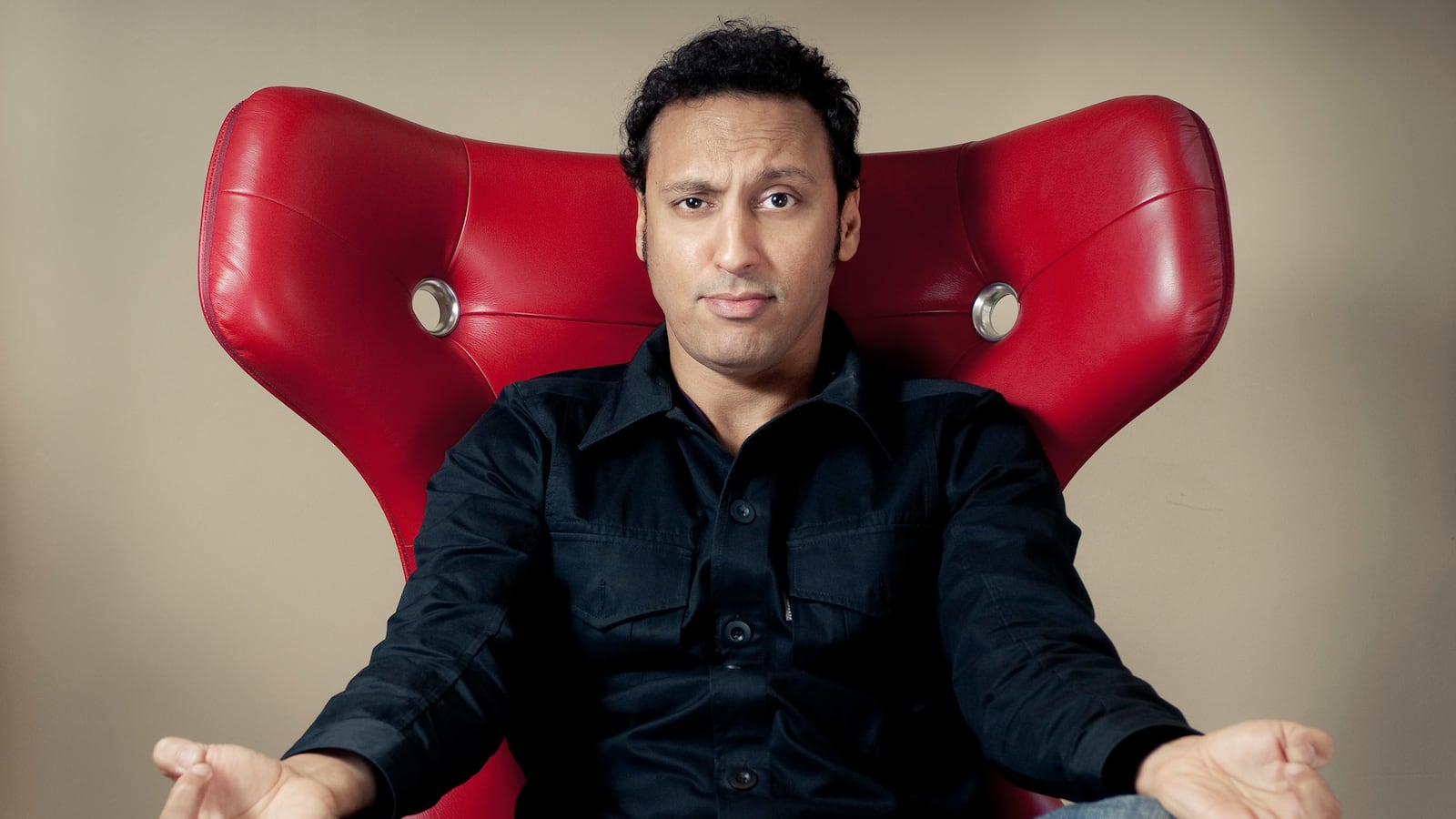Jon Stewart is known to be many things. He’s been an award-winning TV host, a critic of the media, a political comedian, and now he’s a movie director with the release this weekend of the film Rosewater, which tells the story of journalist Maziar Bahari, who was imprisoned and tortured by the Iranian government.
But he has done one other thing most aren’t aware of: Stewart has “radicalized” Aasif Mandvi. It wasn’t by design, but in the eight years Mandvi has worked on "The Daily Show" as the “all-things brown correspondent,” Stewart has turned Mandvi into the “jihadist of irony.” And ironically, he has also brought Mandvi more in touch with being a Muslim.
I sat down this week with Mandvi, my long time friend, to discuss his new book No Land’s Man, which is a collection of comedic essays about his life. The book is a very funny yet brutally honest look at all things Mandvi, including why he didn’t even want to audition for “The Daily Show,” the “joys” of growing up brown in the United Kingdom, his complicated relationship with Islam, and what it was like to play the role in numerous movies of “Terrorist No. 4.”
1. “Fucking the Chicken.” This expression, as I have heard from you before, actually means something good has happened from your point of view as a “Daily Show” correspondent. So why is “fucking the chicken” a good thing?
Well, “fucking the chicken” is an expression I use when I am doing a field piece for “The Daily Show.” It’s when someone we are interviewing says something really outrageous or honest that they or their lawyers wish they had never said. It’s as if they just told us they had fucked a chicken.
2. In your new book, you wrote your father wanted to move to the United States from the United Kingdom because of one word. And that word wasn’t “freedom.” It wasn’t “democracy.” It was something else. What was that word?
Brunch. I’m serious. My father had visited the States years before we moved here and was totally taken by this American concept of brunch. When he came back to the UK, he told us: [imitating his father’s Indian accent] “The beauty of America is that that they have so much food that between breakfast and lunch they have to stop and eat again. Breakfast and Lunch! Put them together and you have brunch. Genius right? Bloody Americans, I love them! Their English is atrocious, but they have a word for everything.”
3. I bet most people would never guess that the way you tried to fit in as a new student at your American high school after moving here from England was by way of your relationship with Michael Jackson. How did the King of Pop personally change your life?
When I first went to high school in Florida, it was not easy to make friends because students tended to hang out with their own races and also I found that in America, you were either black, white, or Hispanic. If you were anything else, you were invisible. I noticed that in my high school’s cafeteria, for example, the white students sat with white students, blacks students sat with black students, and the two East Asian students sat with the math teacher.
There was one other Indian student, but he was born and raised in the United States and he wanted nothing to do with me. I was a dorky Indo-English kid with a South Asian afro, and he was the all-American type, on the baseball team, et cetera. He saw me as a social liability.
So, I was a big fan of Michael Jackson, and this was when he was truly the King of Pop. I realized that I could dance and sing like him. And back in 1984, Michael Jackson had had just enough surgery to where he wasn’t white yet but he kind of looked like… an Indian girl. And when I was 18, so did I, so it made sense I guess. In my book I talk about how I was unconsciously in my own life challenging the way people saw me race-wise, in the same way Michael did in his career.
At my school’s big talent show, I ended up doing an impersonation of Michael Jackson that I hoped would be so great that I would no longer be invisible in my school. So there I was, fedora and glove and Jheri curl. An Indian British kid transplanted to a Tampa high school stage performing as a black man who looked like an Indian girl and my grandmother was in the audience. You don’t get more American than that!
4. So...how did it go?
You have to buy the book. Sorry, I hate to be that way but look, I need to sell this book. I’m only on basic cable. It's one step above YouTube. (Laughing.)
5. In your book you mention Islam in various places. It’s clearly a part of who you are but at the same time you note that you aren’t the best Muslim. If I were to list your relationship status with Islam on a Facebook profile, it would be “complicated.” What is about you and Islam?
Let me put it this way: The day I got hired at “The Daily Show,” I told my father that Jon Stewart wants me to be the show’s “senior Muslim correspondent.” My father responded, “This has to be a joke.” I explained it is a comedy show to which he said, “I hope so!” He was actually so worried that I would say idiotic things about Islam that he told me, “If Jon Stewart asks you any question about Islam, don’t say a word, just have him call your mother, she knows everything.”
But surprisingly over the eight years of working on the show I became more in touch on some level with being culturally Muslim. It was in some way related to the fact that for the first time after 9/11, I was forced to deal with and sometimes interview people saying truly ignorant or hateful comments about Islam, which was eye opening and troubling to me.
6. You also note in your book that over the eight years of working on “The Daily Show” you, were “radicalized” by Jon Stewart and you now view yourself as “the jihadist of irony” and as a "terrorist of comedy.” What is going on at the show that it did this to you?
Well, “The Daily Show” was like my “joke madrassa.” Madrassa means “school” for those who don’t watch “Homeland.” Ironically enough this madrassa is run mostly by Ivy League-educated Jews. So I was being taught how to commit “jihad” against the bullshit, the hypocrisy, and the ignorance. And while I may have been at first hesitant to discuss Islam, in time I started to note that we were actually saying something in service of Muslim Americans who are truly not represented much in mainstream media.
Soon I had brown cab drivers and even Muslim groups applauding my work, which I truly never expected or sought. In fact, a few years ago I was awarded the "Courage in Media" award from the Council on American Islamic Relations. As I sat at my table with the other award recipients, I started chatting with the guy next to me. He told me his name was Malek Jandali and that he was a pianist from Syria. I jokingly asked him how he got the award: “Did you dress up like Lady Gaga in Damascus?”
He said, “No, I performed at an event in Washington D.C., in support of the Syrian opposition. Because of that the Syrian Army invaded my home in Syria and brutally beat my parents.”
I felt like crap. Jandali then asked me: What do you do?” “Me?” I responded, “I’m a smart ass.”






